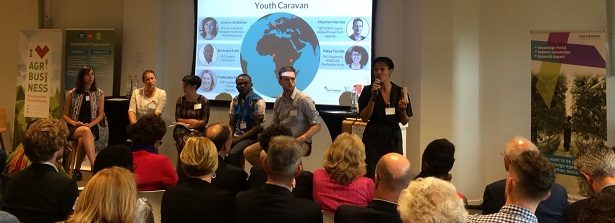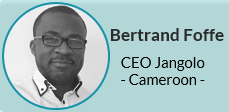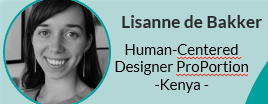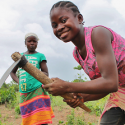Youth Caravan

During the Youth Caravan in the Youth workshop on agricultural transformation at the foodFIRST conference, five young professionals from diverse backgrounds introduced themselves and their link to agrofood. After this, a Q&A was moderated by Ama van Dantzig from Dr. Monk, a social enterprise.
The goal of the Youth Caravan was to inspire and engage the audience, get opinions and experiences on different approaches – what works best when connecting with young entrepreneurs? – and to identify opportunities for different types of stakeholders. In this article you can find more details about the background of the participants in the Youth Caravan, and when you click the “Read more” button, you can read the Q&A:
- Bertrand Foffe, social entrepreneur in Cameroon
- Fredrieke Muijs, YEPer at TU Delft Valorisation Centre in Uganda
- Maarten Hermus, YEPer at VDS A’campo Holland GreenTech in Uganda
- Lisanne de Bakker, Proportion Enterprise in Kenya
- Maya Turolla, University of Bologna (Italy) and the Radboud University (Nijmegen)
Bertrand Foffe
Social entrepreneur Bertrand Foffe shared the story of his company Jangolo, an AgTech startup using technology to empower the agricultural value chain in Cameroon in order to improve farmers’ productivity and efficiency. Three platforms have been created: one (www.farmer.cm) to allow the farmer to easily manage his production and easily get in touch with his main partners (fellow farmers, suppliers and business customers); the second platform (www.jangolo.cm) is specialized in selling farmers productions to end users in Douala; the third one (www.agro.cm) is a selling platform for business customers. This way, farm-to-market trajectory is facilitated more efficiently. The productivity platform (on it prototype version) has led Jangolo Farm to the final round of the Pitch AgriHack 2016 in Nairobi. Since then, due to the training from CTA and other programs, considerable improvements were made to the platform, which counts over 8000 users today.
Please click on the “Read more” button to find the Q&A with Bertrand Foffe.
Q&A Bertrand Foffe
 Q: Can you elaborate on why you decided to set-up your own company in Cameroon?
Q: Can you elaborate on why you decided to set-up your own company in Cameroon?
A: Coming from a poor neighborhood in Cameroon, I consider myself as a privileged person living and working in the Netherlands. Before the current situation in my country (poverty, unemployment, etc…) I had the choice to be either an accomplice spectator or an actor. I made the choice to be part of the solution.
Q: Why the agricultural sector?
A: Agriculture is the first employer in Cameroon as in many other African countries. In fact, most of the generation preceding mine had theirs school fees paid by agricultural activities of their parent. Agriculture is probably the most impactful sector in Cameroon. Many families rely on their crops to send their children to school all over the country. But the most alarming thing is the fact that, this majority is for the most part living in poverty. By making a change in agriculture we are convinced that we will make the most impact on Cameroon and on Africa.
Q: What role for ICT? What role for youth?
A: Internet specifically and technology more generally has given the opportunity to Africa to disrupt the development standard in the world. The penetration of the mobile in an environment that has skipped landline phone is a perfect example of the steps Africa could leverage to boost its growth. In that sense, ICT is a major tool to disrupt, innovate and find appropriate and local solutions to African problems. This is where the connection with youth comes into place. We have the youngest population and digital age is globally led by young people. This is therefore an opportunity to provide that skills needed to young Africans to contribute in finding solutions for African problems.
Q: You have joined the CTA Pitch AgriHack in 2016: can you explain the purpose of this challenge and the added value for you specifically?
A: Six month after we started www.farmer.cm a good friend of mine, Flavien Kouatcha adviced us to participate to the Pitch Agrihack. For us it was a bit too soon to participate because we were pretty much at the beginning of the BETA version of our prototype. However we applied and were selected first for the semi-final and then to the final round.
The Pitch AgriHack is a competition organized by the CTA for ACP countries. The concept is to bring forward and boost youth from ACP countries using technology to solve agricultural problems locally. The 2016 edition was the first and we were greatly excited by the outcome when leaving for Nairobi in November 2016. Our participation was probably the most important turning point in the history of our company. In fact, by meeting with many other innovators from all over ACP countries, we understood many points, namely : 1). The problem we decided to tackle is in fact a great opportunity; 2). Many organizations are ready guiding us and advising us; 3). Many young people have already tried many different approaches and failed, so we should learn from other experiences; and 4). Networking with others agripreneurs was the best step towards an eventual coverage of the continent in the future. As we were preselected in the Advanced Category of the Pitch, we did not win the final price, but we came from Nairobi with a clearer vision and better strategy to deploy our services.
Q: What do you see as the role for youth in agricultural transformation?
A: I see the role of youth in agricultural transformation first as disruptive actors and then as bridge builders. In fact very few solution can just be copied and paste in Africa. We really need to apply some design thinking approach to come out with unique but effective solutions to the problems that we have. Youth in that sense represents the best actor for innovation: we know technology and we know the context. One good example of this in our context is the fact that at some point we had to find a way to convert quantities between “Cageot” (the unit measure that is mainly applied in Cameroon to buy tomatoes) and kilogram that can be easily perceived by e-customers.
On the other hand, we have the majority of farmers in Africa that belong to generations that is not familiarized with new technologies. The challenge also represent an opportunity for youth who can empower old farmers by filling the gap of technology. For example we started a test program six month ago with the objective to access farmers in remote area in Cameroon. The concept is simple, we give special account to students in cities like Dschang – which is a small city in Cameroon – with one of the biggest universities of the country. As part time job, the students visits local farmers and collect their crops availability and quantity. This information is send to our servers and we can find buyers for those farmers creating a win-win situation for everyone.
Q: Can you share some examples of what young men and women are already doing to adapt to changing conditions within agriculture and the innovations they are continuously being implemented in agri-food systems?
A: From our own company, Jangolo has built an ecosystem for farmer that allows them to reduce the time they spend on non-farming activities (logistic, sales, etc…) by ten. By putting all the buyers and suppliers on the same platform we considerably accelerated the processes in the agribusiness value chain in Cameroon. Also with the recent implication of youth in the food transformation, more and more agripreneurs start ventures in all the segments of the value chain. For example Kenza Market, one of the brands that we commercialized on our platform www.jangolo.cm, sells ready to cook ingredients to middle class households. The project is an example of a Cameroonian lady living abroad who decided as we did, to go back to Africa and be part of the solution.
Young Expert Programmes (YEP)
From the Young Expert Programmes (YEP), two YEPers shared their experiences: Frederieke Muijs, who is a Young Expert at TU Delft Valorisation Centre in Uganda; and Maarten Hermus Young Expert at VDS A’campo Holland GreenTech in Uganda. The Young Expert Programmes (YEP), consisting of YEP Agrofood & YEP Water, is to offer young Dutch and local professionals the opportunity to gain experience abroad and to take their first steps in an international environment through Dutch organizations. The Young Experts are placed on projects that are related to the Agrofood and Water themes and that contribute to the goals the Dutch government has set with regards to development cooperation.
Frederieke Muijs
Frederieke is working on developing the TAHMO business model. THAMO stands for Trans Africa Hydro Meteorological Observatory. It aims to set up over 20,000 stations across sub-Sahara Africa. In addition to this, she works as the local project coordinator for TU-Delft projects taking place in the area, to write project proposals and help manage projects which have been selected. Last but not least, she is providing tailor made trainings on entrepreneurship.
Please click on the “Read more” button to find the Q&A with Frederieke Muijs.
Q&A Frederieke Muijs
 Q: You are joining the Young Expert Program to gain international experience in the Agrofood sector: what do you think of these youth-specific initiatives?
Q: You are joining the Young Expert Program to gain international experience in the Agrofood sector: what do you think of these youth-specific initiatives?
A: The YEP is an excellent program facilitating companies to hire young experts and giving them the chance to develop themselves in their area of expertise and internationally.
Q: You give trainings on entrepreneurship: what do you think of the current focus on youth agripreneurship in Africa?
A: The topic of entrepreneurship is becoming increasingly more popular. There are also plenty of organisations developing curricula and training manuals for the different educational curricula across African countries. I work a lot in Rwanda and it is in this country that I feel that majority of the population is limited to thinking outside the box. We have given them many exercises to encourage out of the box thinking but their responses are far from out of the box.
Q: What do you think is most essential for young agripreneurs?
A: Open mindset of staff and facilities.
Q: What works best and why in agripreneurship?
A: Keeping an open mind. Inspire the Youth and encourage them to try to think beyond!
Q: Is the education system inadvertently socializing young people away from agriculture and rural life? What is needed for change?
A: I do not agree that the current education system is encouraging people to move away from agriculture and rural life. In Uganda many people have a job in the city and are conducting agricultural jobs on the side. In general we can probably say that about 60% of the African population is currently dependent on the agricultural sector for a source of income/livelihood. This cannot be maintained in the future agricultural production has to intensify (move away from subsistence farming). African countries have to start developing their service sectors.
Maarten Hermus
Maarten is working as the Business Developer of VDS A’campo/Holland GreenTech in Uganda. Holland GreenTech is an integrated one-stop-shop horticultural supplier and service provider. By providing products, training and service they are working on the next step of horticulture.
Please click on the “Read more” button to find the Q&A with Maarten Hermus.
Q&A Maarten Hermus
 Q: The horticulture sector is said to provide opportunities for youth, have you also experienced this and where do you think are the most important opportunities?
Q: The horticulture sector is said to provide opportunities for youth, have you also experienced this and where do you think are the most important opportunities?
A: Vegetable production is a high potential sector for upcoming farmers to commercialize and develop an increased income from their farm earnings. This business perspective creates opportunities for youth to become employed or entrepreneurs in this value chain specifically. We see great examples of this at our clients.
Q: You are working on building and managing long-term relationships with Dutch suppliers, what do you think could be a role for Dutch stakeholders to address the challenges of youth agripreneurship in Uganda/ African context?
A: I think their key role is to see how Dutch suppliers can get active in the markets in East- and Southern Africa because it is an interesting market from a business perspective, and also contributes to developing this market further. For Dutch suppliers, it is key to look for partners who can deliver the service/knowledge package with the products as this is key of developing a market for high quality inputs.
Q: How can your company be inclusive to youth? Are you attentive to this?
A: First, we are attentive to this as we see that our gender balanced, young, teams in all off our countries creates the right team spirit for developing an idea for a business into successful companies. Second, farmers, including youth, are for example invited to visit our free trainings by which we can also include for example youth in developing their knowledge on vegetable production.
Q: How to bridge the disconnect with the private sector from multinational corporations to national companies and local entrepreneurs?
A: We are very good at this, and I think this is because of our integrated teams with different backgrounds so we are able to understand both our multinational suppliers and our local clients by our backgrounds within the company.
Q: What are your experiences on the variety in support needed in the different sectors of agribusiness and stadia of the value chain?
A: I think there is a need for stronger funding by and for private sector programs to support them in their vision. For the development of agribusiness this should be the lead. Less coordination and facilitation by non-private sector but more direct funding to private sector initiatives that contribute to development especially for upcoming farmers who want to be in agribusiness. Because it works.
Lisanne de Bakker
Lisanne de Bakker from Proportion Enterprise explained about the program Vijana Reloaded, a social enterprise with the purpose to empower youth in boosting their income, productivity and contribution to socio-economic development in rural Kenya through entrepreneurship that leverages on ICT applications and the agri-business sector. In January 2018, a one-year pilot “Agri-Vijana” started to develop the first ‘business-in-a-box’ in partnership with SNV and SoilCares. A human-centered design approach is used, by actively involving local youth, farmers and stakeholders during the research, design and implementation phase. Based on the field research phase opportunities were identified for rural youth to provide extension services to potato farmers. Potato is one of the key crops for food security in Kenya, but the sector is under developed and unorganized. Several service ideas will be developed from June 2018 on.
Please click on the “Read more” button to find the Q&A with Lisanne de Bakker.
Maya Turolla
Maya Turolla, a social scientist and development studies specialist, is currently bringing to an end her PhD within a partnership program between the faculties of Political and Social Studies of the University of Bologna (Italy) and the Radboud University (Nijmegen). Her PhD research is titled “Policies and practices around youth in agribusiness in Uganda: an ethnographic perspective”. Her research focuses on the intersection between policies and practices around agripreneurship in Uganda. Two recent working papers, in collaboration with IITA, can be found here. Maya shared her insights from her research and fieldwork around new development trends in Uganda, and the social impact on young Ugandan agripreneurs and their response to such development projects. Maya also got engaged in the promotion of young professionals’ voice in agriculture as communication focal point for YPARD – Netherlands country chapter.
Please click on the “Read more” button to find the Q&A with Maya Turolla.








